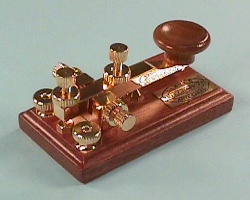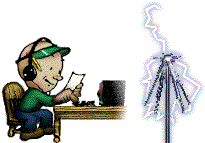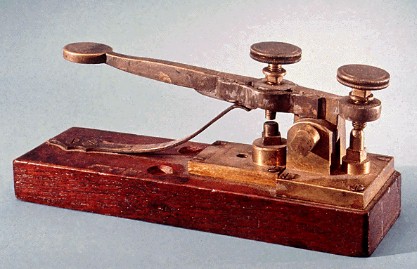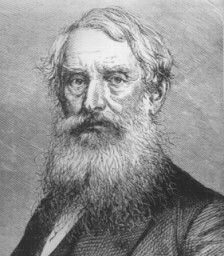

![]()
![]()



![]()
![]()
"CW - The Grass Roots of Amateur Radio"
CW is definitely my favorite mode. I have found that it cannot be beat for weak signal communications. No other mode can even come close. I have spent many hours over the years chasing after DX on both SSB and CW. Thousands of contacts have been logged on the HF and VHF bands.
When comparing the success rate of CW vs. SSB there is no question about it. The number of completed QSO's on CW is way ahead of SSB or any of the other modes. My QSO total and DX total on CW is ahead of any of the other modes by several thousand. The Morse code has allowed me to get through to stations I otherwise would not have been able to communicate with.
One very important point. The equipment needed to operate CW at QRP levels can be very inexpensive. A CW transmitter, receiver or transceiver can be built from a kit or from scratch for just a few dollars. Some very good performing radios are offered in kit form for as little as 10 dollars. This extremely low cost makes ham radio accessible to almost anyone and can help increase the number of amateur radio operators.
"CW and QRP
- A  Combination!"
Combination!"
The Morse code and CW have always been an important part of ham radio. The present licencing structure requires that you need to pass a Morse code examination to make use of the high frequency bands. I believe this is a good thing since CW is the most efficient and dependable mode in existence today. Having the ability to communicate with the most reliable mode makes for more reliable and highly skilled radio operators. During many natural disasters such as hurricanes, floods, typhoons, and earthquakes, low power CW transceivers are all that are available at times in many third world countries.
Certain types of propagation require the use of CW and the Morse code. Other modes just won't do the job. Some of the more exotic and high-tech operating techniques such as EME, (Earth-Moon-Earth, or Moon-Bounce), Aurora and High Speed Meteor Scatter are just a few examples. The ability to use Morse code opens up a whole new world of different operating styles and techniques. Every amateur radio operator should take the time to learn the Morse code and use it! -VE6BPR-
*Note - Some amateurs may be exempt from taking the Morse code examinations to gain access to the high frequency bands due to a disability. These amateurs are not expected to have to learn the code. Check with your local government radio agency for more information.
"Remove the Grass Roots and what's left? - Wasteland!"

Here are a few of my favorite CW links.
CW Links
Art and Skill of Radio Telegraphy
Australian Overland Telegraph Line
Bencher, Inc. If you know CW, you know of Bencher
paddles
Canadian Railway Telegraph History Contains interesting "Morse in
Movies"
FOC First Class CW Operators Club
FISTS - The International Morse
Preservation Society
FISTS Northwest Club
Ham Radio Online - Morse Code in Music
JF0KOG/JN3VOG Key collector from Japan
Milestone
Technologies Inc.
Dealer of keys and paddles from around the world.
Morse 2000 Homepage Think Morse is dying? - Visit here
Morse Code and the Phonetic Alphabets For those totally new to CW
Morse Enthusiasts Group Scotland
Morse's Equipment Pictures and stories of Morse's gear
Morsum Magnificat A wealth of Morse info from Britain
PA3BWK's Ultimate CW Website Much info & many links
Radio Amateurs of Canada News Bulletins in Morse Midi Format ![]()
Scandinavian CW Activity Group Founded in '74 to promote CW
Society of Wireless Pioneers The folks who used CW on ships, at shore
stns, etc.
Sparks Telegraph Key Review Many pictures of keys
Telegraph & Scientific Instrument
On-Line Cyber-Museum
Fantastic - by W1TP
Telegraph Lore by KF5N
The Telegraph Office Definitive site for history of telegraphy
Telegraph Wireless World by N6TT
VWOA Veteran Wireless Operators Association
Vibroplex Company Well known maker of keys, bugs, paddles
W1AW Code Practice Schedule

Morse/Vail telegraph key, 1844. This key was used to send the message "What Hath God Wrought" on the experimental line between Washington, DC and Baltimore, Md.
To use the High Frequency (HF) spectrum on the amateur radio bands you must be qualified to do so by holding the proper licence. Passing a Morse code examination is one of the requirements to operate on the HF bands. If you would like to become qualified to use these bands, the computer software below can be very useful in helping you learn the Morse code. Morse code training cassette tapes are also very popular. You can find these tapes from several ham radio organizations and ham radio supply shops. Study manuals for the theory part of the ham radio examinations are also available from these same sources.
MORSE CODE TRAINING PROGRAMS
Codemaster V
DMorse Program by G0MDO (freeware)
International Morse Code Program By Phil, KE3FL
The Mill By W4FOK - Includes American Morse and
Morse Nostalgia
Morse Academy Freeware
Morse Code Deciphered Another CW Trainer
Morse Code Practice QSO's For use with software like SuperMorse,
etc.
Morse Code Teaching Machine Neat Morse philosophy
MRX For Windows 95/NT - from Australia
Nu Morse Code Trainer Increase your speed
PED Contest Simulator Download it here
Pile Up! By G4ZFE - practice your CW contesting
skills
RUFZ Great contest practice program with
world-wide competition for top scores
Super Morse Download Super Morse here

Samuel F.B. Morse (1791-1872), "Father of the Morse Telegraph"
Member #1,000,230

(Check out our
"SPOOF" organization - Click on the sign above!)
![]() "LEARN THE
CODE"
"LEARN THE
CODE" ![]()
![]()
![]()
![]()
CW
- The Hottest Mode Going !